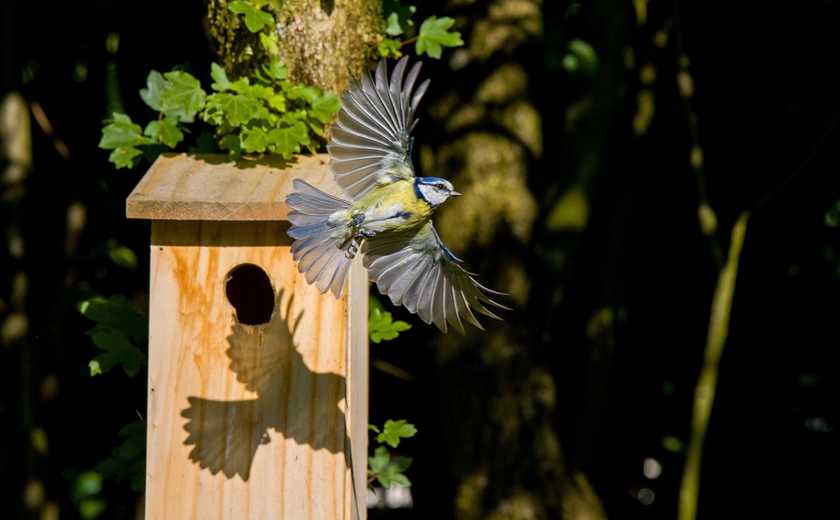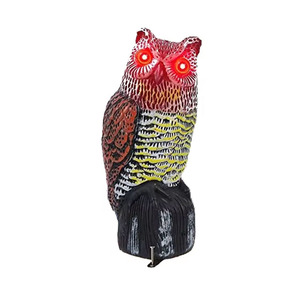Are birds constantly invading your space and causing damage? You’re not alone.
Finding effective ways to keep them away can be frustrating. Luckily, certain noises can help scare birds off without harming them or your surroundings. You’ll discover simple sound-based tricks that really work to protect your garden, home, or business. Keep reading to learn how to use these noises to take back control and enjoy your space bird-free.
Types Of Bird-scaring Noises
Ultrasonic soundsuse very high frequencies. Birds cannot hear them well. These sounds bother birds and make them fly away. They do not harm birds or other animals.
Predator callsmimic the sounds of birds’ enemies. These calls scare birds by making them think danger is near. Common calls include hawks or owls. Birds avoid areas with these sounds.
Loud bangs and explosionsare sudden, loud noises. They startle birds and make them leave quickly. These noises can come from firecrackers or special devices. Frequent use is needed to keep birds away.
Mechanical noise devicescreate regular sounds like clapping or clicking. These noises disturb birds and stop them from settling. Some devices rotate or move to add variety and keep birds scared.
Effectiveness Of Different Noises
Birds react to noises in unique ways. Some birds fly away quickly. Others might stay still and listen. Loud bangs can scare pigeons. Chirping sounds might bother sparrows. Understanding these responses helps pick the right noise. Not all birds fear the same sounds. Choosing the right noise is key.
Birds can get used to noises over time. This is called habituation. New noises might scare them at first. But they learn to ignore them. Changing sounds often can help. Use different noises every few days. This keeps birds alert and away.
Noises work better at certain times. Early morning is a good time. Birds are active then. Evening can also be effective. Birds settle down for the night. Loud noises might disturb them. Using noise at the right time is important.
Setting Up Noise Devices
Place noise devicesnear areas where birds gather most. Corners, rooftops, and gardens work well. Avoid placing devices too close to human activity to keep noise comfortable.
Change device locations regularly to stop birds from getting used to the noise. Move devices every few days or weeks for best results.
| Timing | Frequency |
|---|---|
| Use noises during early morning and late afternoon. | Turn devices on and off intermittently, not continuously. |
| Adjust timing based on bird activity patterns. | Vary sound patterns to avoid bird adaptation. |
- Check power sources daily for reliable operation.
- Use solar panels or batteries to avoid cords.
- Keep devices clean and free from dust or debris.
- Replace batteries before they run out to prevent silence.
Combining Noise With Other Deterrents
Birds often get scared by loud noises, but sounds work best with other tools. Using visual scareslike shiny objects, fake owls, or moving flags can make birds nervous. These things catch their eyes and keep them away.
Physical barriersalso help stop birds from landing. Nets, spikes, and wires block birds from roosting or eating crops. These barriers create a tough place for birds to settle.
Chemical repellentsadd another layer of protection. Safe sprays or gels make surfaces unpleasant for birds. These repellents do not harm birds but make them want to leave.
Combining noises with these methods keeps birds away more reliably and for longer times.
Safety And Environmental Considerations
Using noises to scare birds away requires care to protect other animals. Sounds should not harm or disturbpets, wildlife, or neighbors. Choose noises that target birds only.
Many places have rules about noise. Check local laws to avoid fines. Noise limits often change by time and area. Keep volume low near homes and schools.
Humane methods cause no pain or harmto birds. Avoid loud blasts or harmful devices. Gentle sounds and short bursts work best. Birds will fly away without injury.
- Use bird-specific sounds only
- Follow local noise regulations
- Keep noise short and controlled
- Protect pets and other wildlife
- Choose sounds that do not harm

Credit: www.backyardboss.net
Popular Commercial Noise Devices
Noises to scare birds away include loud sounds like alarms, distress calls, and explosions. These devices create discomfort, encouraging birds to leave the area quickly. Many businesses use them to protect crops and buildings from bird damage.
Sonic Bird Repellers
Sonic bird repellersuse high-frequency sounds to keep birds away. These sounds are usually inaudible to humansbut very annoying to birds. They can cover large areas and work well in open spaces. Easy to install and operate, these devices do not harm birds.
Gas-powered Bird Scare Guns
Gas-powered scare gunsmake loud noises similar to gunshots. The sounds startle birds, making them fly away quickly. These devices work best in farms and fields. They have adjustable timers to control noise frequency. Quiet times can be set to avoid disturbing people.
Electronic Bird Call Players
Electronic bird call playersplay recorded bird distress calls or predator sounds. Birds hear these and feel danger nearby. This scares them away without using loud noises. These players are useful in gardens and vineyards. They can cycle through different calls to avoid bird adaptation.
Diy Noise Solutions
Use empty cansor pots to create loud noises. Hang them on strings and let the wind move them. This makes sounds that birds dislike.
Aluminum foil strips can be cut and hung. They catch sunlight and flutter, making noises and shiny flashes that scare birds.
- Shake a jar with small stones inside.
- Tap metal spoons together.
- Use plastic bottles filled with small pebbles.
Change the noise patterns often. Birds get used to the same sounds. Try different rhythms and loudness. This keeps birds alert and away.

Credit: www.alibaba.com

Credit: www.youtube.com
Frequently Asked Questions
What Noises Effectively Scare Birds Away From Gardens?
Loud, sudden sounds like banging pots or clapping scare birds quickly and keep them away.
Can Ultrasonic Bird Repellers Help Reduce Bird Problems?
Yes, ultrasonic devices emit high-frequency sounds that birds dislike but humans can’t hear.
How Often Should Noises Be Used To Deter Birds?
Use noises regularly but change sounds often to prevent birds from getting used to them.
Conclusion
Birds can cause damage to gardens and crops. Using noises to scare them away helps protect your plants. Sounds like alarms, recordings, or loud bangs work well. Changing the sounds often keeps birds from getting used to them. Safe and simple methods are best for your environment.
Keep trying different noises to find what works best. Protect your space without harming the birds. Small efforts can make a big difference in keeping birds away.
